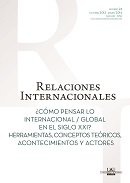Core, periphery and the reception of International Relations Theory in Brazil
Keywords:
Brazil, International Relations Theory , International Relations , Core-PeripheryCopyright (c) 2013 Mónica SALOMON

This work is licensed under a Creative Commons Attribution-NonCommercial-NoDerivatives 4.0 International License.
Abstract
The call for papers of the 22nd issue of the journal Relaciones Internacionales proposed to inquire, develop or clarify the International Relations Theories produced in, and from, the South. In this article we challenge the view —implied in the “call for papers”— that the fault North-South is the more productive approach to understand the dynamics and evolution of the discipline of International Relations around the world. Taking into consideration that the institutional development of the discipline in a Northern country like Spain is smaller than the one of a Southern country like Brazil, we try to look at that differently. As we see it, International Relations Theory is produced in a Centre, that is to say almost exclusively in the United States and in a lesser way Great Britain and other Middle-Northern European countries. The Periphery of International Relations, from this perspective, is wider that what we understand by the South or global South. In a dialogue with articles on International Relations in Brazil published in the 22nd issue (mainly Daniel Jatobá’s and to a lesser extent the article by María Elena Lorenzini and María Gisela Pereyra Doval), we develop some considerations on Brazil reception of International Relations Theory, in the understanding that they could be useful to advance a general reflexion about some of the dilemmas raised by the transmission of IRT in the Periphery. Last, we advocate for a strategy for the international embedment of ideas based on dialogue and methodological rigor, which alien to any fashion be it mainstream or alternative.





